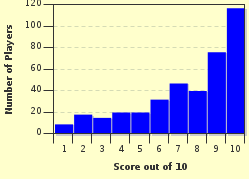Quiz Answer Key and Fun Facts
1. Under the leadership of Sir John A. Macdonald, the Conservative Party won every federal election in Canada except one. In which election did his party finish 2nd, and what was the main issue that attributed to the loss?
2. In the election of 1917, Sir Wilfred Laurier's Liberal Party opposed the Conservative-led Union Party and finished 2nd. The Liberals were overwhelmingly supported by the French Canadians who resented the Conservative Party's wartime policy. Which specific policy enraged the French Canadians?
3. In 1921, a new political party emerged and finished 2nd over one of the two major political parties in Canada (Conservative Party). What was the name of this party? (This party ceased to exist after merging with the Conservative Party in the future.)
4. In the Canadian election of 1925, Mackenzie King's Liberals ended up in 2nd place behind the Conservatives. However, King was still allowed to remain as the Prime Minister for another year, even though the Conservative Party elected more Members of Parliament and was poised to form a minority government. What was the cause of this unusual incident?
5. In 1956, this Minister of External Affairs (and future Prime Minister) became the first Canadian to win the Nobel Peace Prize for his contribution in resolving the Suez Crisis. However, this did not help his party in the election of 1957, in which the Liberals finished 2nd. What was the name of this Minister?
6. John Diefenbaker's Conservatives won the Canadian election of 1958 by an overwhelming margin but fared much worse in 1963 when they finished 2nd. Over this period, Diefenbaker, an overly idealistic leader, made several misguided foreign policy decisions that contributed to his downfall. However, which of the following was NOT a decision he actually made.
7. In the Canadian elections of 1968, 1972, and 1974, this Conservative leader finished 2nd in every election behind the Liberals led by Pierre Trudeau. His supporters dubbed him 'the best Prime Minister we [Canada] never had'. Who was he?
8. Less than a year after winning the 1979 Election, Joe Clark's Conservatives finished 2nd behind Trudeau's Liberals in the Canadian election of 1980. He was forced to call this election when the Opposition passed a vote of non-confidence against Clark's minority government for breaking an important campaign promise. What measure did the Opposition object in the budget, which NDP's Bob Rae described as "the budget that stole Christmas"?
9. In the Canadian election of 1988, Liberal leader John Turner made a very memorable debate performance by passionately advocating against certain Conservative policy. Liberals still finished 2nd in the election but would have fared much worse without this debate performance. What was this policy, which Turner warned would threaten Canada's status as an independent country?
10. The Canadian election of 1993 ended the Conservative Party's status as a major political party in Canada (not to be confused with the new Conservative Party founded in 2003). Which party finished 2nd in the election, thus becoming the official Opposition for the first time in the party's history?
Source: Author
byoungpark
This quiz was reviewed by FunTrivia editor
gtho4 before going online.
Any errors found in FunTrivia content are routinely corrected through our feedback system.

